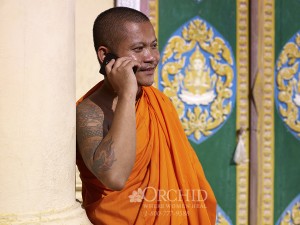Buddhist Advice on Smartphone Addiction

It’s 2014, the new iPhone just came out, things like texting and social media are such common place they are quickly being considered potential addiction, and digital devices like iPads and smartphones have their hooks in billions of people from every walk of life. I have my phone in my hand texting right now, and I’m sure I’ll be using it in about .2 seconds to check my Facebook.
Some potentially addictive substances have many benefits when they are used correctly responsibly. Some medications help many people, but when an addict gets there hands on it, it can be abused to the extent it can be considered a dangerous poison. What is becoming more obvious in today’s society is that the smartphone and other technology is quickly become one of these items that can be pushed beyond the technologies intended use to obsessive abuse.
A Monks Idea of Addiction
Pomnyun Sunim, a Korean Buddhist monk and global humanitarian leader feels that the growing addiction to technology is a certainty, and recently in an interview stated,
”iPads are great,[But] they’re only great if you can use them without becoming too attached or fixated. And as many of us know, this isn’t always an easy thing to do.”
Pomnyun does not however blame the devices themselves, as many people who have spoken up in the past urging people to unplug from this metaphorical matrix.
”There’s no value judgment. The bad thing is if you’re obsessed over it every day.”
Pomnyun went on to share his recommendations for addressing the obsession on technology, and these suggestions sound an awful lot like any other drug rehabilitation program. The monk suggested someone dealing with an addiction to technology go on a digital detox period.
”It is good for us to be free from habit or addiction, because you become a slave to the object or technology. It’s good to take a step back to examine yourself. Test yourself, and see how you react—from a third person—when you go without technology for a whole weekend. If you’re always curious and trying to hold yourself off, then you know that you’re addicted.”
Pomnyun also recommended detoxing from other addictions as well. For one day, he suggests leaving the house with no cash or credit cards. This may seem a little bit more hazardous for some of us, but in reality is another way to test our self-reliance.
In Buddhist doctrine, these collective dependencies are called “karma” and they can hold dominion our lives. According to Pomnyun becoming more aware of our behaviors can help us extricate ourselves from our harmful and inhibiting habits and find peace of mind.
“Addiction is something natural that happens to the brain when we do something repeatedly,” he says. “That cognitive habit—and the whole scheme of cognitive habits—is called karma. That karma becomes your master. So it’s that karma, or group of habits, that is leading you. So it’s very important to practice freeing yourself from that karma.”
So at the end of the day, what this monk is trying to tell us is that the best way to free ourselves from the obsession always begins with a cleansing. Abstinence is the key to gaining continuous freedom from any obsession, and addiction is the same. Because once we free ourselves from the string that attach us to the substance, we are able to experience new freedom and happiness. Because karma does not need Wifi.
Addiction comes in all shapes and sizes, and so do those who get addicted to the things that hold them back and restrict their lives. It does not take a high priest or Buddhist monk to break free of an addiction, but it does take the willingness to get the right help. If you or someone you love is struggling with substance abuse or addiction, please call toll-free 1-800-777-9588. We want to help. You are not alone.
